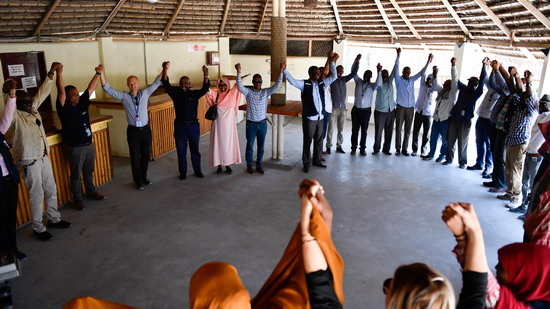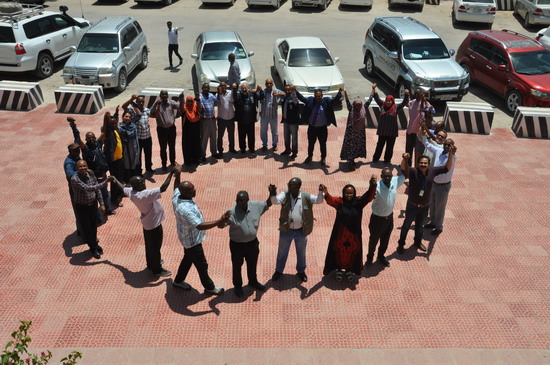 Mogadishu, Somalia, 9 April, 2019 – WHO in Somalia joined the world in marking World Health Day on 7 April by forming a human solidarity chain with representatives of United Nations agencies and key partners in Mogadishu. All around the world solidarity chains were formed to mark the Day and symbolize the importance of strong partnership and commitment in improving health care.
Mogadishu, Somalia, 9 April, 2019 – WHO in Somalia joined the world in marking World Health Day on 7 April by forming a human solidarity chain with representatives of United Nations agencies and key partners in Mogadishu. All around the world solidarity chains were formed to mark the Day and symbolize the importance of strong partnership and commitment in improving health care.
The theme of this year’s campaign was improving primary health care ‒ an entry point to the health care system ‒ as a path to achieving universal health coverage. Universal health coverage means that all people and communities can access quality health care, in an equitable manner, without being exposed to financial hardships.
Somalia is currently in the process of finalizing a roadmap in its drive to progress towards universal health coverage. This roadmap complements Somalia’s national health policy goals, and takes into consideration the current health situation across the country. With support from WHO and key partners, including donors and UN agencies, Somalia will look at ways to support communities so they can access health services.
“The Somali people are among the most resilient in the world,” said HE Dr Fauziya Abikar, Minister of Health of Somalia’s Federal Government. “If we focus on primary health care through which a mother and child can access the best services, we can contain bigger challenges.”
The Head of the UN Support Office Mr Amadu Kamara stated, “For a country like Somalia, where life expectancy for women and men is low, improving primary health care is of utmost importance. We express our solidarity and support, on behalf of all UN agencies in the country, towards using primary health care as a fundamental approach to improving health care.”
“Between 80 and 90% of essential health services can be delivered at primary health care level, including in emergencies,” said Dr Mamunur Malik, WHO Representative in Somalia. He added that WHO and Member States were promoting family practice-based, primary health care as a way to improve the overall health situation in countries. Dr Malik called upon all actors, from policy-makers to UN agencies and individuals in the community to come together to work towards the equitable and attainable goal of “Health for all, by all”. He also commended health workers in Somalia, particularly women, for their dedication to providing health services under challenging circumstances in the country.
In Hargeisa, on World Health Day, health authorities presided over a graduation ceremony for 12 medical doctors from remote rural areas after they had completed a 9-month training course in emergency obstetric care, aiming to save the lives of mothers and newborns. The training was conducted by health authorities, WHO, the University of Hargeisa and other partners.
 In Baidoa, health authorities and representatives of UN agencies came together to celebrate the occasion and raise awareness of the importance of universal health coverage and the ways in which Somalis could gain access to better health care.
In Baidoa, health authorities and representatives of UN agencies came together to celebrate the occasion and raise awareness of the importance of universal health coverage and the ways in which Somalis could gain access to better health care.
In other events to commemorate World Health Day, which marks WHO’s founding in 1948, Dr Mamunur Malik held bilateral discussions with HE Dr Fauziya A Nur to reaffirm their commitment to strengthening Somalia’s health system. WHO also held an open question and answer session on Twitter (@WHOSom) on Sunday, where members of the public had the opportunity to talk to a WHO health expert, Dr Rizwan Humayun, to learn more about universal health coverage and the health situation in Somalia.


